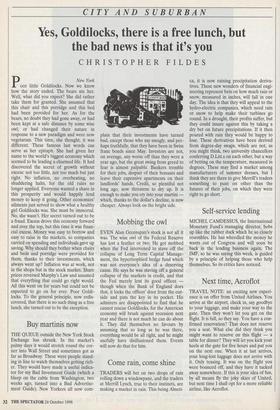CITY AND SUBURBAN
Yes, Goldilocks, there is a free lunch, but the bad news is that it's you
CHRISTOPHER FILDES
PNew York oor little Goldilocks. Now we know how the story ended. The bears ate her. Well, what did you expect? She did rather take them for granted. She assumed that this chair and this porridge and this bed had been provided for her. As for the bears, no doubt they had gone away, or had been kept at a safe distance by some wise owl, or had changed their nature in response to a new paradigm and were now vegetarian. This time, she thought, it was different. These famous last words can serve as her epitaph. She had given her name to the world's biggest economy which seemed to be leading a charmed life. It had discovered the secret of growth without excess: not too little, not too much but just right. No inflation, no overheating, no shuddering halts, for the old rules no longer applied. Everyone wanted a share in this prosperity and would happily lend money to keep it going. Other economies' ailments just served to show what a healthy girl Goldilocks was. She must be immortal. No, she wasn't. Her secret turned out to be a fraud. Excess drove this economy forward and over the top, but this time it was finan- cial excess. Money was easy to borrow and easy to raise in the markets, so companies carried on spending and individuals gave up saving. Why should they bother when chairs and beds and porridge were provided for them, thanks to their investments, which always went up? Inflation was at work, not in the shops but in the stock market. Share prices reversed Murphy's Law and assumed that everything that could go right would. All this went on for years but could not be expected to go on for ever. Poor Goldi- locks. To the general principle, now redis- covered, that there is no such thing as a free lunch, she turned out to be the exception.


















































































 Previous page
Previous page